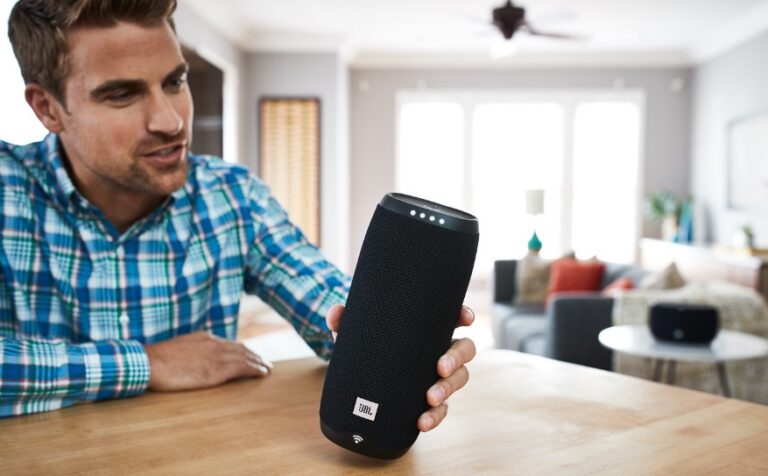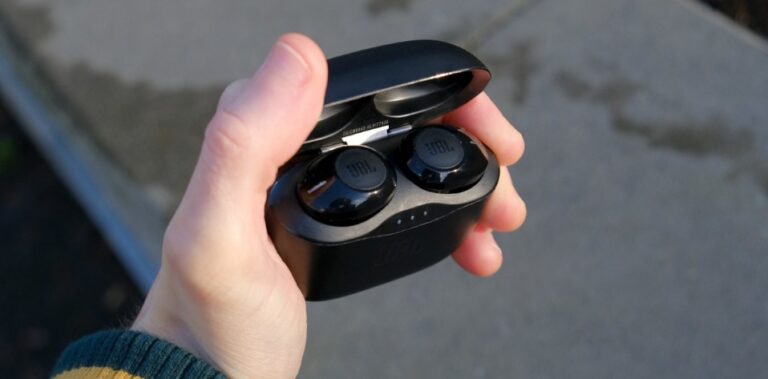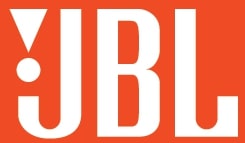
JBL Partybox 310
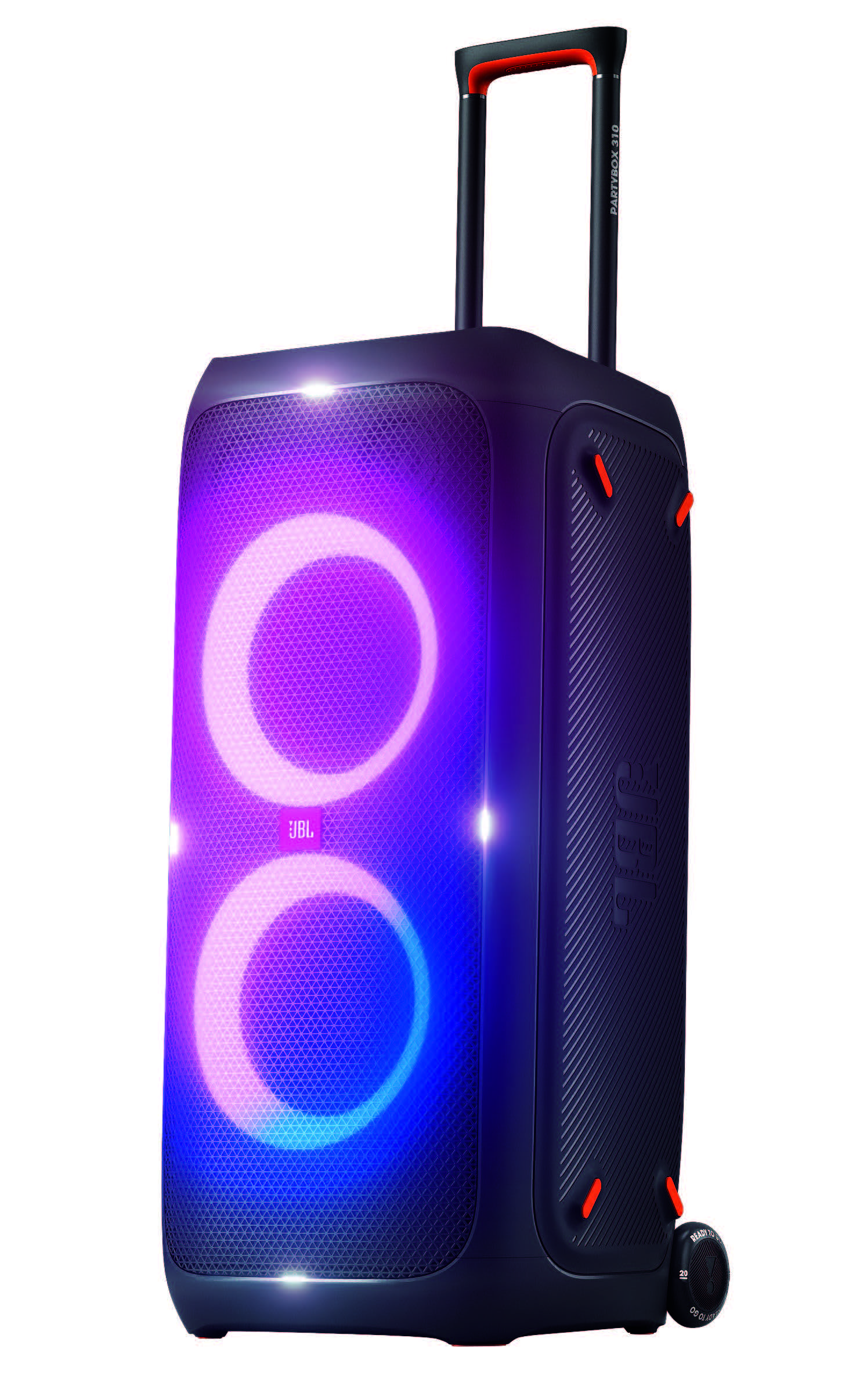
About JBL
The American audio equipment firm JBL’s headquarters are in Los Angeles, California. JBL caters to both the residential and commercial markets. The professional market includes studios, installed/tour/portable sound, music production, DJ, and movie theatres.
The home market includes high-end automobile audio and home amplification/speakers/headphones. Harman International, a division of Samsung Electronics, owns JBL.
American audio engineer and loudspeaker designer James Bullough Lansing (1902–1949) is most renowned for creating JBL, which is derived from his initials. Altec acquired Lansing, which he had previously founded, to create Altec Lansing.
IMPORTANT SAFETY INSTRUCTIONS
For all products:
- Read these instructions.
- Keep these instructions.
- Heed all warnings.
- Follow all instructions.
- Do not block any ventilation openings. Install this apparatus according to the manufacturer’s instructions.
- Do not install this apparatus near any heat sources such as radiators, heat registers, stoves, or other apparatus (including amplifiers) that produce heat.
- Do not defeat the safety purpose of the polarized or grounding-type plug. A polarized plug has two blades one wider than the other. A grounding-type plug has two blades and a third grounding prong. The wide blade or the third prong is provided for your safety. If the provided plug does not fit into your outlet, consult an electrician for the replacement of the obsolete outlet.
- Protect the power cord from being walked on or pinched, particularly at plugs, convenience receptacles, and the point where they exit from the apparatus.
- Use only attachments/accessories specified by the manufacturer.
- Use only with the cart, stand, tripod, bracket or table specified by the manufacturer or sold with the apparatus. When a cart is used, use caution when moving the cart/apparatus combination to avoid injury from tip-over.
- Unplug this apparatus during lightning storms or when unused for long periods.
- To disconnect this apparatus from the AC mains completely, disconnect the power-supply cord plug from the AC receptacle.
- The mains plug of the power-supply cord shall remain readily operable.
- Do not expose batteries to excessive heat such as sunshine, fire, or the like.
- This apparatus is intended to be used only with the power supply and/or charging cable provided by the manufacturer.
CAUTION
- RISK OF ELECTRIC SHOCK. DO NOT OPEN.
- THE LIGHTNING FLASH WITH AN ARROWHEAD SYMBOL, WITHIN AN EQUILATERAL TRIANGLE, IS INTENDED TO ALERT THE USER TO THE PRESENCE OF UNINSULATED “DANGEROUS VOLTAGE” WITHIN THE PRODUCT’S ENCLOSURE THAT MAY BE OF SUFFICIENT MAGNITUDE TO CONSTITUTE A RISK OF ELECTRIC SHOCK TO PERSONS.
- THE EXCLAMATION POINT WITHIN AN EQUILATERAL TRIANGLE IS INTENDED TO ALERT THE USER TO THE PRESENCE OF IMPORTANT OPERATING AND MAINTENANCE (SERVICING) INSTRUCTIONS IN THE LITERATURE ACCOMPANYING THE PRODUCT.
- WARNING: TO REDUCE THE RISK OF FIRE OR ELECTRIC SHOCK, DO NOT EXPOSE THIS APPARATUS TO RAIN OR MOISTURE.
INTRODUCTION
Congratulations on your purchase! This manual includes information about PARTYBOX 310 speakers. We encourage you to take a few minutes to read this manual, which describes the product and includes step-by-step instructions to help you to set up and get started. Read and understand all the safety instructions before using your product.
If you have any questions about these products, their installation, or their operation, please contact your retailer or customer service, or visit us at www.jbl.com.
WHAT’S IN THE BOX
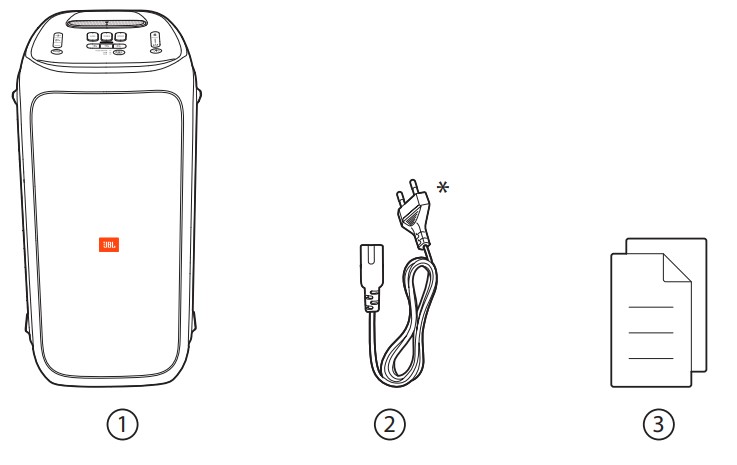
- Main unit
- Power cord*
- Quick Start Guide, Safety Sheet, Warranty Card
Power cord quantity and plug type vary by region.
PRODUCT OVERVIEW
Top Panel
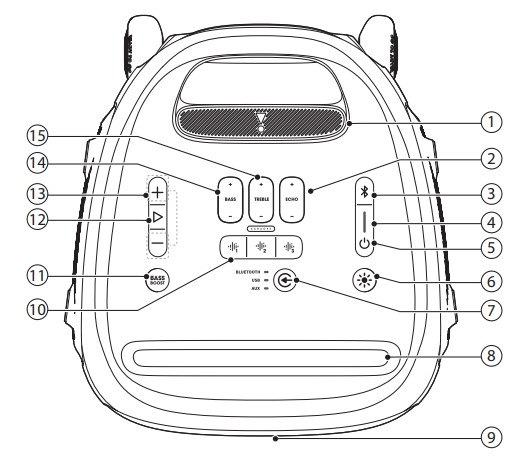
- Telescopic handle
- – ECHO +
- Adjust the echo level.
- Press to enter Bluetooth pairing mode.
- Press and hold for more than 10 seconds to forget all paired devices.
- Battery level indicator
- Turn the power on or off.
- Press to switch between different light patterns.
- Hold for more than 2 seconds to turn the strobe light on or off.
- Select an input source: BLUETOOTH, USB, or AUX.
- Mobile device dock
- LED ring Select a special sound effect such as horn, clapping, or scratch.
- Enhances the bass level: level 1, level 2, or off.
- Play, pause, or resume.
- Adjust the main volume.
- BASS +
- Adjust the bass level.
TREBLE + - Adjust the treble level.
Caution: Do not look directly at the light-emitting parts when the speaker
lights are turned on.
- Adjust the bass level.
LED behavior
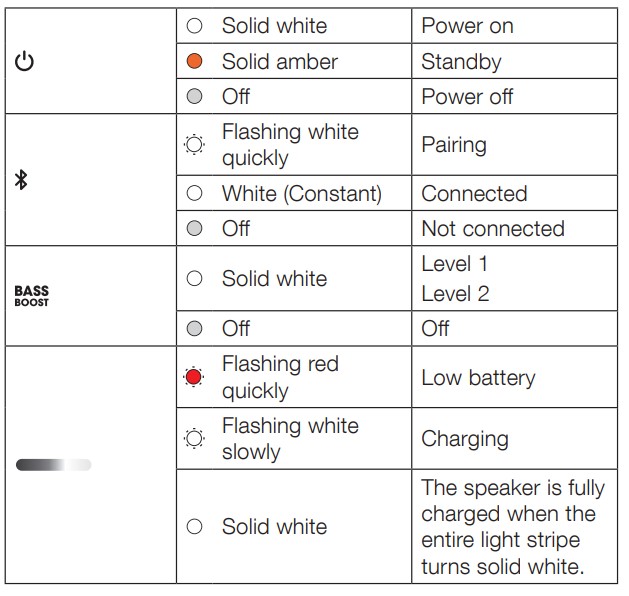
Back Panel
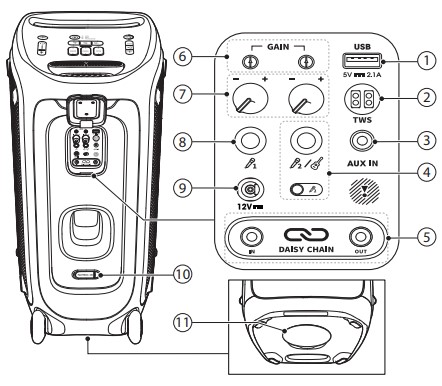
- USB
- Connect to a USB storage device.
- Charge your mobile device.
- TWS
- Press to enter True Wireless Stereo (TWS) pairing mode.
- AUX IN
- Connect to an external audio device through a 3.5 mm audio cable (not supplied).
- Connect to a microphone or guitar.
- IN/OUT
- Daisy-chain multiple PARTYBOX speakers through 3.5 mm audio cables (not supplied).
- GAIN controls
- Adjust the gain of the corresponding microphone or guitar input.
- Microphone/guitar volume
- Adjust the volume of the corresponding microphone/guitar (if connected).
- Connect to a microphone.
- Connect to 12V DC power supply.
- AC
- Connect to AC power supply.
- Pole-mounting your PARTY BOX
PLACEMENT
Caution:
Do not sit or lean on the speaker or push it sideways to avoid tip-over and possible damage. Place the speaker on a flat, stable surface and ensure that the rubber feet side is down.
POWER ON
Cautions:
- Use the provided power cords only.
- You can use either AC/DC power or the built-in battery as a power supply for the speaker.
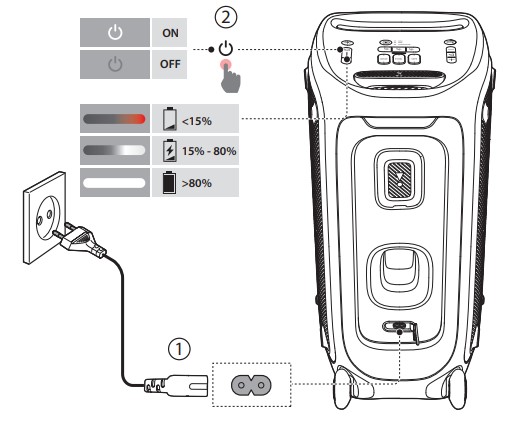
- Connect AC power.
- To use the built-in battery, disconnect the AC or DC power after charging the speaker.
- Press to power on.
- At step 1, you can also connect DC power using a cigarette lighter cable (sold separately): 46-ADT500-XX1 (US); 46-ADT502-XX1 (Non-US).
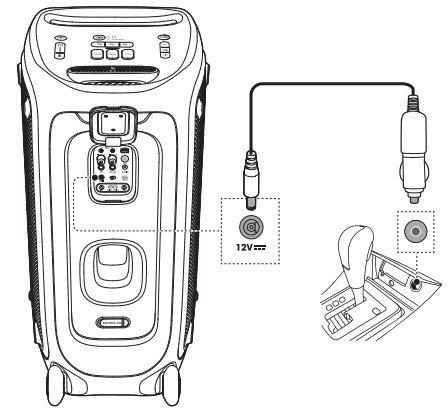
Tips:
- Fully charge the speaker before first use to prolong the lifespan of the built-in battery.
- You can check the battery level by pressing any button on the speaker.
- The speaker switches to standby mode automatically after 20 minutes of inactivity. You can press on the speaker to switch to normal operation.
USING YOUR PARTY BOX
Notes:
- Only one sound source can be played at a time. The priority orders are USB -> BLUETOOTH -> AUX.
- Starting a source with a higher priority will always interrupt a source with a lower priority.
- To start a source with lower priority, stop the source with higher priority first.
Bluetooth Connection
You can use the speaker with your Bluetooth-enabled smartphone or tablet.
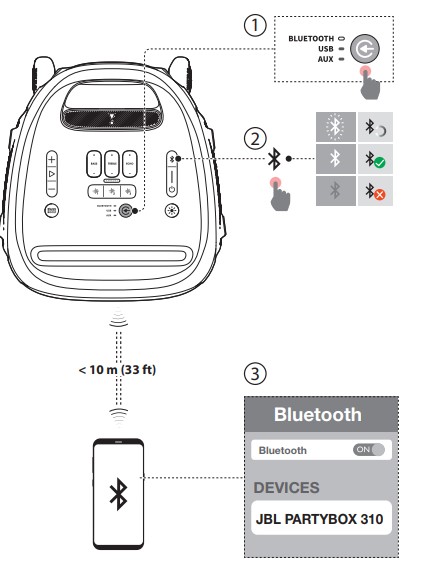
- Switch to the BLUETOOTH source.
- Press on the speaker to enter Bluetooth pairing mode.
- Choose “JBL PARTYBOX 310” on your Bluetooth device to connect.
- Once successfully connected, you can stream audio from your Bluetooth device to this speaker.
Notes:
- This speaker can memorize a maximum of 8 paired devices. The ninth paired device will replace the first one.
- Enter “0000” if a PIN code is requested for connection to a Bluetooth device.
- Bluetooth performance can be affected by the distance between this product and your Bluetooth device and the environment of operation.
To terminate the Bluetooth-enabled device:
- Turn off this speaker, or
- Disable Bluetooth on your device.
To reconnect the Bluetooth-enabled device:
- When you turn on this speaker next time, it tries to reconnect the last connected device automatically.
- If not, manually select “JBL PARTYBOX 310” on your Bluetooth device to connect.
USB Connection
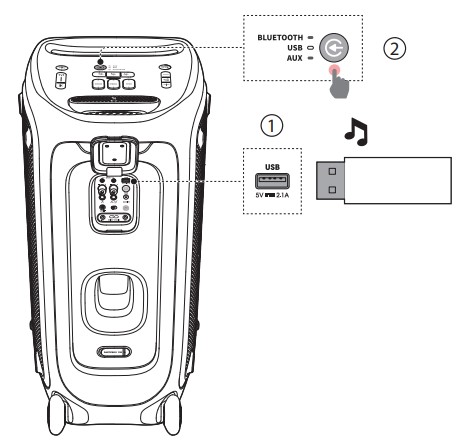
- Plug a USB storage device that contains playable audio contents into the USB port of the speaker.
- Switch to the USB source.
- Audio playback will start automatically.
Tip:
The speaker plays audio files on the USB storage device from the root folder to the last level of subfolders in alphabetical sequence. Up to 8 levels of subfolders are supported.
Supported audio formats
| Extension | Codec | Sample rate | Bitrate |
|
WAVE |
PCM |
8 / 11.025 /
12 / 16 / 22.05 / 24 / 32 / 44.1 / 48 |
384 / 529.2 / 576 / 768 / 1058.4 / 1152 / 1536 / 2116.8 / 2304 |
|
MP3 |
MPEG1 layer2/3 |
32 / 44.1 / 48 |
32 / 40 / 48 / 56 / 64 /
80 / 96 / 112 / 128 / 160 / 192 / 224 / 256 / 320 |
| MPEG2
layer2/3 |
16 / 22.05 /
24 |
8 / 16 / 24 / 32 / 40 /
48 / 56 / 64 / 80 / 96 / 112 / 128 / 144 / 160 |
|
| MPEG2.5
layer3 |
8 / 11.025 /
12 |
8 / 16 / 24 / 32 / 40 / 48 /
56 / 64 / 80 / 96 / 112 / 128 / 144 / 160 |
|
|
WMA |
8 / 11.025 / 16 / 22.05 / 32 / 44.1 / 48 |
5 / 6 / 8 / 10 / 12 / 16 /
20 / 22 / 32 / 36 / 40 / 44 / 48 / 64 / 80 / 96 / 128 / 160 / 192 / 256 / 320 |
Music Control
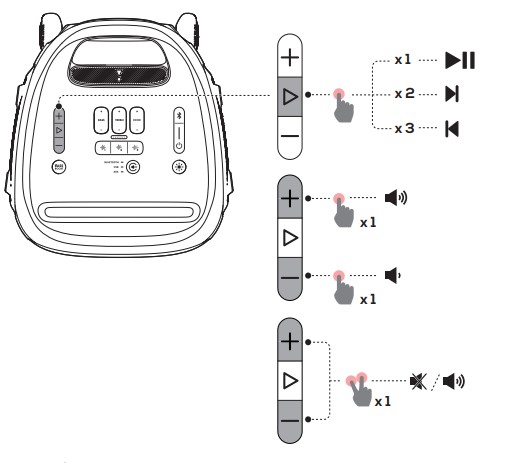
Press once to pause or resume playback.
- Press twice to skip to the next track.
- Press three times to skip to the previous track.
- Press +/- to increase or decrease the main volume.
- Hold the + and – buttons simultaneously to mute or unmute sound output.
- Press BASS BOOST to enhance the bass level: level 1, level 2, or off.
Note:
The skip operation is unavailable in AUX mode.
AUX Connection
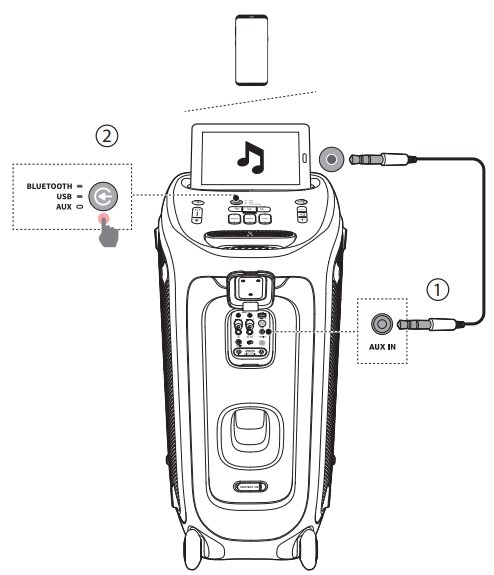
- Connect an external audio device to the speaker through a 3.5 mm audio cable (not supplied).
- Switch to the AUX source.
- Start audio playback on the external device.
Mixing Sound with a Microphone and/or Guitar
By using a microphone or electric guitar (not supplied), you can mix sound with an audio source.
Notes:
- Always set the guitar or microphone volume to the minimum level before the guitar or microphone connection/disconnection.
- Always disconnect the guitar or microphone when you are not using them.
Connecting a Microphone
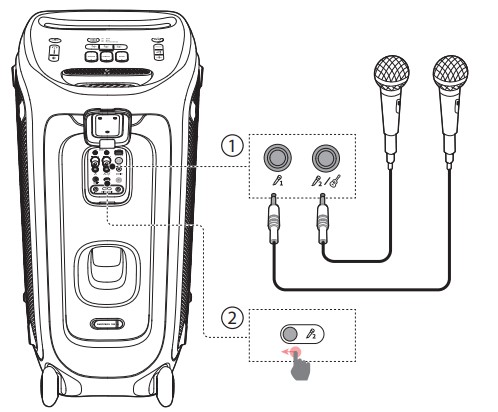
- Connect a microphone to the socket.
- When connecting a microphone to the socket, switch the slider to show.
Connecting a Guitar
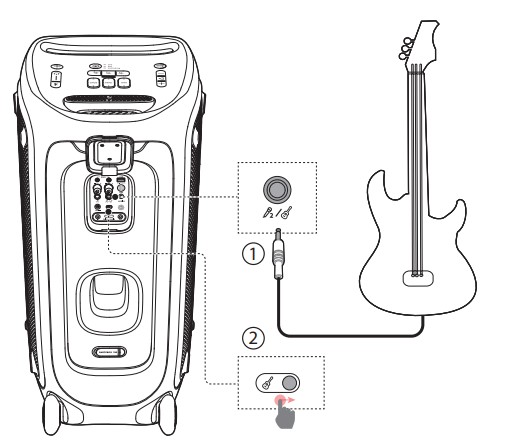
- Connect a guitar to the socket.
- Switch the slider to show.
Mixing Sound
Sing through the microphone or play guitar.
- To adjust the volume of the audio source, press /.
- To adjust the volume of the microphone or guitar, rotate the MIC or GUITAR volume knob.
- To adjust the gain of the wired microphone or guitar, rotate the GAIN control beside the MICROPHONE or GUITAR socket respectively.
- To adjust the echo, treble, and bass level of the microphone (either wireless or wired), rotate the ECHO, TREBLE, and BASS knobs respectively.
Charging Your Mobile Device
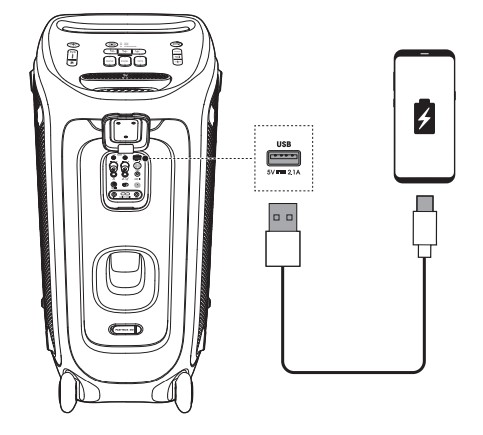
CARRYING YOUR PARTY BOX
Cautions:
- Before carrying the speaker, ensure that all the cords are disconnected.
- To avoid personal injury and/or property damage, hold the product firmly while carrying it.
The telescopic handle design allows you to move the speaker around easily.
To extract the handle:
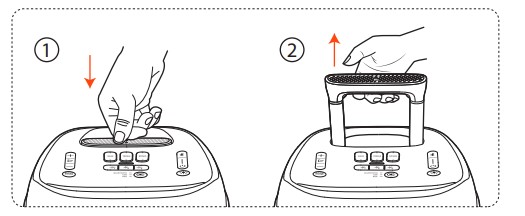
To retract the handle:
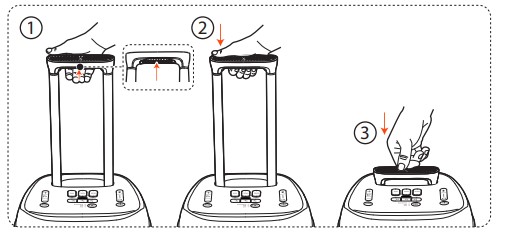
Caution for carrying the speaker:
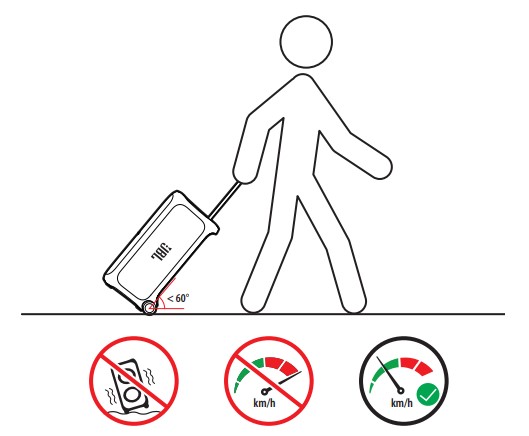
To avoid tip-over, do not drag the speaker on uneven surfaces or slopes where stability is doubtful. Stop or slow down when you feel any wiggle in the wheels.
POLE-MOUNTING YOUR PARTY BOX
Cautions:
- Installation must be done by qualified persons using safe rigging standards.
- The installer is responsible for the proper selection and use of mounting hardware, to properly and safely pole-mount the speakers.
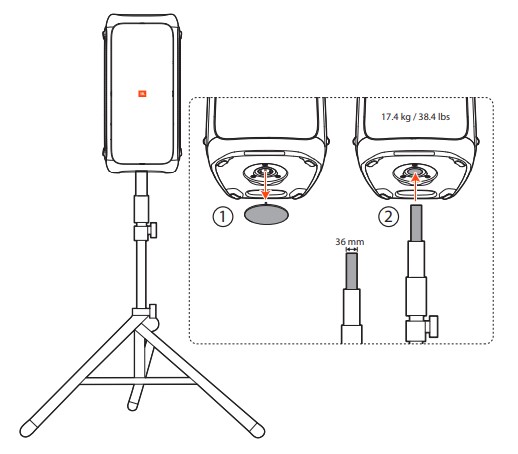
Caution FCC and IC statement for users (USA and Canada only)
This device complies with part 15 of the FCC Rules. Operation is subject to the following two conditions: (1) This device may not cause harmful interference, and (2) this device must accept any interference received, including interference that may cause undesired operation.
CAN ICES-3(B)/NMB-3(B)
Federal Communication Commission
Interference Statement
This equipment has been tested and found to comply with the limits for a Class B digital device, under Part 15 of the FCC Rules. These limits are designed to provide reasonable protection against harmful interference in a residential installation.
This equipment generates, uses, and can radiate radio frequency energy and, if not installed and used by the instructions, may cause harmful interference to radio communications. However, there is no guarantee that interference will not occur in a particular installation.
If this equipment does cause harmful interference to radio or television reception, which can be determined by turning the equipment off and on, the user is encouraged to try to correct the interference by one or more of the following measures:
- Reorient or relocate the receiving antenna.
- Increase the separation between the equipment and the receiver.
- Connect the equipment to an outlet on a circuit different from that to which the receiver is connected.
- Consult the dealer or an experienced radio/TV technician for help.
Caution: Changes or modifications not expressly approved by HARMAN could void the user’s authority to operate the equipment. For Products That Transmit RF Energy
FCC AND IC INFORMATION FOR USERS
This device complies with Part 15 of the FCC rules and Industry Canada license-exempt RSS standard(s).
Operation is subject to the following two conditions:
- This device may not cause harmful interference; and
- This device must accept any interference received, including interference that may cause undesired operation.
FCC/IC Radiation Exposure Statement
This equipment complies with FCC/IC RSS-102 radiation exposure limits set forth for an uncontrolled environment.
FCC Caution:
High-power radars are allocated as primary users of the 5.25 to 5.35 GHz and 5.65 to 5.85 GHz bands. These radar stations can cause interference with and/or damage this device.
No configuration controls are provided for this wireless equipment allowing any change in the frequency of operations outside the FCC grant of authorization for US operation according to Part 15.407 of the FCC rules.
IC Caution:
User should also be advised that:
- The device for operation in the band 5150-5250 MHz is only for indoor use to reduce the potential for harmful interference to co-channel mobile satellite systems;
- the maximum antenna gain permitted for devices in the bands 5250-5350 MHz and 5470-5725 MHz shall comply with the e.i.r.p. Limit: and
- The maximum antenna gain permitted for devices in the band 5725-5825 MHz shall comply with the e.i.r.p. Limits specified for point-to-point and non-point-to-point operation as appropriate.
- Users should also be advised that high-power radars are allocated as primary users (i.e. priority users) of the bands 5250-5350 MHz and 5650-5850 MHz and that these radars could cause interference and/or damage to LE-LAN devices.
Exposure of humans to RF fields (RSS-102)
The computers employ low gain integral antennas that do not emit RF field over Health Canada limits for the general population; consult Safety Code 6, obtainable from Health Canada’s Website at http://www.hc-sc.gc.ca/
The radiated energy from the antennas connected to the wireless adapters conforms to the IC limit of the RF exposure requirement regarding IC RSS-102, Issue 5 clause 4. SAR tests are conducted using recommended operating positions accepted by the FCC/RSS with the device transmitting at its highest away from the body. Non-compliance with the above restrictions may result in a violation of FCC RF exposure guidelines.
Use Restriction: Attention in France, the operation is limited to indoor use within the band 5150-5350 Mhz.
For Products with Radio Receivers, That Can Use an External Antenna (USA ONLY) CATV (Cable TV), or Antenna Grounding
If an outside antenna or cable system is connected to this product, be certain that it is grounded to provide some protection against voltage surges and static charges. Section 810 of the National Electrical Code (NEC), ANSI/NFPA No. 700-1984, provides information concerning proper grounding of the mast and supporting structure, grounding of the lead-in wire to an antenna discharge unit, of grounding conductors, location of antenna discharge unit, connection to grounding electrodes and requirements of the electrode.
Note to CATV System Installer
This reminder is provided to call the CATV(cable TV) system installer’s attention to articles 820-40 of the NEC, which provides guidelines for proper grounding and, in particular, as close to the point of cable entry as possible.
Caution: This product uses a laser system. To prevent direct exposure to the laser, do not open the cabinet enclosure or defeat any of the safety mechanisms provided for your protection.
Do NOT START INTO THE LASER BEAM. To ensure the proper use of this product, please read the owner’s manual carefully and retain it for future use. Should the unit require maintenance or repair, please contact your local JBL service. Refer servicing to qualified personnel only.
FOR ALL EU COUNTRIES
For products that include audio out Prevention of hearing loss
Caution: Permanent hearing loss may occur if earphones or headphones are used at high volume for prolonged periods.
For France, the products have been tested to comply with the Sound Pressure Level requirement laid down in the applicable NF EN 50332 L.5232-1.
Note:
To prevent possible hearing damage, do not listen to high volume levels for long periods.
WEEE Notice
- The Directive on Waste Electrical Equipment (WEEE), which entered into force as European law on 14/02/2014, resulted in a major change in the treatment of electrical equipment at end-of-life.
- The purpose of this Directive is, a first priority, the prevention of WEEE, and in addition, to promote the reuse, recycling, and other forms of recovery of such wastes as so as to reduce disposal. The WEEE logo on the product or its box indicates the collection of electrical and electronic equipment consisting of the crossed-out wheeled bin, as shown below.
DISPOSAL
This product must not be disposed of or dumped with your other household waste. You are liable to dispose of all your electronic or electrical waste equipment by relocating over to the specified collection point for recycling such hazardous waste.
Isolated collection and proper recovery of your electronic and electrical waste equipment at the time of disposal will allow us to help conserve natural resources.
Moreover, for proper recycling, and collection points, please contact your local city center, household waste disposal service, shop from where you purchased the equipment, or manufacturer of the equipment.
RoHS Compliance
This product is in compliance with Directive 2011/65/EU of the European Parliament and of the Council of 8 June 2011 on the restriction of the use of certain hazardous substances in electrical and electronic equipment.
For Products that include Batteries
- EU Batteries Directive 2013/56/EU
- A new battery directive 2013/56/EU on Battery and Accumulator replacement directive entered into force on 01/07/2015. The directive applies to all types of batteries and accumulators (AA, AAA, button cells, rechargeable packs) including those incorporated into appliances except for military, medical, and power tool applications. The directive sets out rules for the collection, treatment, recycling, and disposal of batteries, and aims to prohibit certain hazardous substances and to improve the environmental performance of batteries and all operators in the supply chain.
Instructions for Users on Removal, Recycling, and Disposal of Batteries
- Remove the batteries from your equipment or remote control, and reverse the procedure described in the owner’s manual for inserting batteries. For products with a built-in battery that lasts for the lifetime of the product, removal may not be possible for the user.
- In this case, recycling or recovery, it becomes necessary to replace such a battery, this procedure must be performed by authorized service centers. In the European Union and other locations, it is illegal to dispose of any battery with household trash.
- All batteries must be disposed of in an environmentally sound manner.
- Contact your local waste-management officials for information regarding the environmentally sound collection, recycling, and disposal of used batteries.
WARNING: Danger of explosion if the battery is incorrectly replaced. - To reduce the risk of fire or burns, don’t disassemble, crush, puncture, short external contact, expose to temperatures above 60°C (140°F), or dispose of in fire or water.
- Replace only with specified batteries. The symbol indicating ‘separate collection’ for all batteries and accumulators shall be crossed-out wheeled bin shown below:
In the case of batteries, accumulators and button cells containing more than 0.0005 mercury, more than 0.002% cadmium, or more than 0.004% lead, shall be marked with the chemical symbol for the metal concerned: Hg, Cd, or Pb respectively.
WARNING:
DO NOT INGEST BATTERIES, CHEMICAL BURN HAZARD [the remote supplied with] This product contains a coin/button cell battery.
If the coin/button cell battery is swallowed, it can cause severe international burns in just 2 hours and can lead to death.
Keep new and used batteries away from children. If you think batteries might have been swallowed or placed inside any part of your body, seek immediate medical attention.
For All Products Except Those with Wireless Operation
HARMAN International hereby declares that this equipment is in compliance with EMC 2014/30/EU Directive, and LVD 2014/35/EU Directive. The declaration of conformity may be consulted in the support section of our Website, accessible from www.jbl.com.
For All Products with Wireless Operation
HARMAN International hereby declares that this equipment complies with the essential requirements and other relevant provisions of Directive 2014/53/EU. The declaration of conformity may be consulted in the support section of our Website, accessible from www.jbl.com.
WARNING
A few people may experience epileptic seizures when viewing flashing lights.
Precautions
Stand Mounting Safety Precautions Always follow instructions and precautionary advice from the speaker stand manufacturer.
This speaker contains a 36 mm receptacle cup to allow mounting on tripod stands or a pole over subwoofers.
When using stands or poles, be sure to observe the following precautions:
- Check the stand or pole specification to be certain the device is designed to support the weight of the speaker. Observe all safety precautions specified by the manufacturer.
- Always verify that the stand (or subwoofer/pole) is placed on a flat, level, and stable surface, and be sure to fully extend the legs of tripod-type stands. Position the stand so that the legs do not present a trip hazard.
- Use this floor stand only on a flat, solid surface. Once the support (extended leg) has been placed and adjusted, carefully tighten the screws and use the safety pin. After placing the speaker on the stand, check for stability: When tilting each direction to 10 degrees (for the surface), the speaker should not turn off. If necessary, reduce the height of the speakers and extend the base of the stand.
- Route cables so that performers, the production crew, and the audience will not trip and topple the speakers over. Inspect the stand (or pole and associated hardware) before each use and do not use equipment with worn damaged or missing parts.
- Do not attempt to place more than one PartyBox series speaker on a stand or pole.
- Always be cautious in windy, outdoor conditions. It may be necessary to place an additional weight (i.e. sandbags) on the base of the stand to improve stability. Avoid attaching banners or similar items to any part of a speaker system. Such attachments could act as a sail and topple the system.
- Unless you are confident that you can handle the weight of the speaker, ask another person to help you get it onto the tripod stand or pole.
FAQs About JBL Partybox 310
What is the JBL Partybox 310?
The JBL Partybox 310 is a portable Bluetooth speaker designed for party use. It features a high-output 240-watt amplifier, two 2.5-inch tweeters, and two 6.5-inch woofers, which provide powerful and clear sound. It also has various lighting effects, including a light show that syncs to the beat of the music.
What are the dimensions of the JBL Partybox 310?
The dimensions of the JBL Partybox 310 are 325mm x 690mm x 367mm (12.8″ x 27.2″ x 14.4″).
How much does the JBL Partybox 310 weigh?
The JBL Partybox 310 weighs approximately 18.3 kg (40.3 lbs).
What kind of inputs does the JBL Partybox 310 have?
The JBL Partybox 310 has various inputs, including two XLR/TRS combo jacks, one 1/4-inch guitar input, and one 3.5mm auxiliary input. It also has a USB port that can be used to charge your mobile devices.
What is the battery life of the JBL Partybox 310?
The JBL Partybox 310 has a rechargeable battery that provides up to 18 hours of playtime on a single charge.
Can I connect multiple JBL Partybox 310 speakers?
Yes, using the True Wireless Stereo (TWS) feature, you can wirelessly connect up to two JBL Partybox 310 speakers.
Can I use the JBL Partybox 310 as a PA system?
Yes, you can use the JBL Partybox 310 as a PA system by connecting a microphone to one of the inputs and adjusting the volume and tone controls.
Does the JBL Partybox 310 come with a warranty?
Yes, the JBL Partybox 310 comes with a one-year warranty from the date of purchase.
What is the frequency response of the JBL Partybox 310?
The JBL Partybox 310 has a frequency response of 45Hz – 20kHz.
What is the maximum sound pressure level (SPL) of the JBL Partybox 310?
The JBL Partybox 310 has a maximum SPL of 128 dB.
Does the JBL Partybox 310 have a built-in radio?
No, the JBL Partybox 310 does not have a built-in radio.
Can I use the JBL Partybox 310 without Bluetooth?
Yes, you can connect a device to the JBL Partybox 310 using a wired connection, such as an auxiliary cable or a microphone.
Does the JBL Partybox 310 come with a remote control?
Yes, the JBL Partybox 310 comes with a remote control that allows you to adjust the volume, change tracks, and activate the lighting effects.
Can I use the JBL Partybox 310 outdoors?
Yes, the JBL Partybox 310 is designed for both indoor and outdoor use. It has a rugged housing and an IPX4 water-resistant rating.
Can I use the JBL Partybox 310 as a power bank to charge other devices?
Yes, the JBL Partybox 310 has a built-in USB port that can be used to charge other devices.
What is the price of the JBL Partybox 310?
The price of the JBL Partybox 310 varies depending on the retailer, but it generally ranges from $499 to $599.
For More Manuals by JBL, Visit the Latest Manual


